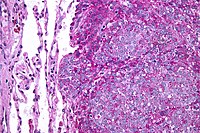
Photo from wikipedia
Abstract Purpose: Lurbinectedin suppresses the oncogenic transcription factor EWS-FLI1 through relocalization to the nucleolus, and delays tumor growth in mice bearing Ewing sarcoma xenografts. On the basis of this rationale,… Click to show full abstract
Abstract Purpose: Lurbinectedin suppresses the oncogenic transcription factor EWS-FLI1 through relocalization to the nucleolus, and delays tumor growth in mice bearing Ewing sarcoma xenografts. On the basis of this rationale, lurbinectedin was evaluated in patients with relapsed Ewing sarcoma. Patients and Methods: This open-label, single-arm, Basket phase II trial included a cohort of 28 treated adult patients with confirmed Ewing sarcoma, measurable disease as per Response Evaluation Criteria In Solid Tumors (RECIST) v.1.1, Eastern Cooperative Oncology Group performance status ≤2, adequate organ function, no central nervous system metastasis, and pretreated with ≤2 chemotherapy lines for metastatic/recurrent disease. Patients received lurbinectedin 3.2 mg/m2 as a 1-hour infusion every 3 weeks. Primary endpoint was overall response rate (ORR) as per RECIST v.1.1. Secondary endpoints included time-to-event parameters and safety profile. Results: ORR was 14.3% [95% confidence interval (CI), 4.0%–32.7%], with median duration of response of 4.2 months (95% CI, 2.9–5.5 months). Median progression-free survival was 2.7 months (95% CI, 1.4–4.3 months), clinical benefit rate was 39.3%, and disease control rate was 57.1%. With 39% censoring, median overall survival was 12.0 months (95% CI, 8.5–18.5 months). Most common grade 3/4 adverse events were neutropenia (57%), anemia, thrombocytopenia, and treatment-related febrile neutropenia (14% each). No deaths or discontinuations were due to toxicity. Conclusions: Lurbinectedin was active in the treatment of relapsed Ewing sarcoma and had a manageable safety profile. Lurbinectedin could represent a valuable addition to therapies for Ewing sarcoma, and is currently being evaluated in combination with irinotecan in advanced Ewing sarcoma in a phase Ib/II trial.
Journal Title: Clinical Cancer Research
Year Published: 2022
Link to full text (if available)
Share on Social Media: Sign Up to like & get
recommendations!